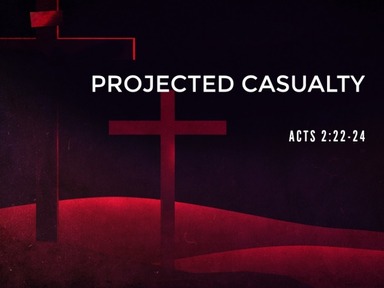Projected Casualty

Notes
Transcript
Introduction
In the calculus of war, death is not a tragedy, it is a tragic necessity.
I believe that statement is true, but I also believe that it offends my 21st century, American, Christian ideals. Life, in my estimation, is precious. To accept its forfeiture is not something I find particularly tolerable.
And yet there have been times and place in history where death was not just accepted but expected and even, projected.
One of the most iconic of those times was the invasion on D Day and the ensuing battle of Normandy during World War 2.
On Tuesday, June 6, 1944. Allied Forces launched the largest amphibious assault ever in an effort to wrest the western coast of France from Nazi control. Some 150,000 soldiers were deployed in the effort.
Planes dropped some 13,000 bombs prior to the invasion (though many appeared to have missed their intended targets)
Ships bombarded the coastline prior to the invasion
Paratroopers were dropped behind enemy lines with the goal of disrupting supplies, communications, and reinforcements (Projected casualties for paratroopers was 75%!)
But eventually, it came down to soldiers landing on heavily defended beaches and fighting their way inland.
Before the fighting ever started, strategists projected that casualties could be quite high:
13% of US troops on D-Day would be drowned
25% would become casualties in the initial fighting on the beaches
3% of US troops per week would become casualties in Normandy
In real numbers, we’re talking about tens of thousands of lives. Knowing the projected casualties, General Eisenhower still ordered the assault carried out. The objective of securing an infantry foothold in France was worth the losses as it would allow the Allies to begin their push into Western Europe.
The Battle of Normandy was a turning point in the war and it was a year later that the Nazi regime came to its inglorious end.
It is right and good that we remember the sacrifice of men who fought knowing they might die but others would live. We are those others.
As much as the idea of projected casualties disturbs our sensibilities, they have always been part of the calculus that is warfare.
Even Jesus spoke of the idea:
31 Or what king, going to make war against another king, does not sit down first and consider whether he is able with ten thousand to meet him who comes against him with twenty thousand? 32 Or else, while the other is still a great way off, he sends a delegation and asks conditions of peace.
Transition
Given the nature of projected casualties, it is not surprising that there was an expected casualty in the greatest war ever waged: the war for mankind.
Illumination
We are reminded of this in Luke’s record of Peter’s sermon on the day of Pentecost in Acts 2.
22 “Men of Israel, hear these words: Jesus of Nazareth, a Man attested by God to you by miracles, wonders, and signs which God did through Him in your midst, as you yourselves also know—23 Him, being delivered by the determined purpose and foreknowledge of God, you have taken by lawless hands, have crucified, and put to death; 24 whom God raised up, having loosed the pains of death, because it was not possible that He should be held by it.
In the immediately preceding verse, Peter quoted Joel 2:32 saying that, “Whoever calls on the name of the Lord shall be saved.” He then goes on to detail exactly whose name we should call on: Jesus of Nazareth (verse 22).
He was attested by God
He was Delivered by God (the determined purpose and foreknowledge)
He was crucified by men
He was raised by God
He was a projected casualty but the objective, our salvation, was worth it to God.
It is fitting that we remember and celebrate his sacrifice too. It is also appropriate that we proclaim it.
How?
26 For as often as you eat this bread and drink this cup, you proclaim the Lord’s death till He comes.
23 For I received from the Lord that which I also delivered to you: that the Lord Jesus on the same night in which He was betrayed took bread; 24 and when He had given thanks, He broke it and said, “Take, eat; this is My body which is broken for you; do this in remembrance of Me.” 25 In the same manner He also took the cup after supper, saying, “This cup is the new covenant in My blood. This do, as often as you drink it, in remembrance of Me.”
26 For as often as you eat this bread and drink this cup, you proclaim the Lord’s death till He comes.